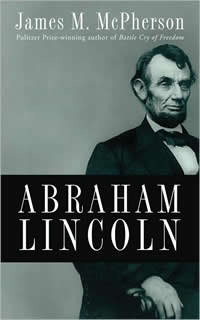Book Notes
 James M. McPherson, Abraham Lincoln (Oxford: Oxford University Press, 2009), 79pp.
James M. McPherson, Abraham Lincoln (Oxford: Oxford University Press, 2009), 79pp.
Among the deluge of books celebrating the 200th anniversary of Lincoln's birth on February 12, 1809 (which birthday he shares with Charles Darwin), James McPherson has written a reliable guide for a general readership. Several times I thought that it would make great family reading. Among McPherson's many books on the Civil War, his Battle Cry of Freedom won a Pulitzer Prize. He's the George Henry Davis '86 Professor of History Emeritus at Princeton University.
Lincoln was born of illiterate parents, but even as a youngster and despite numerous odd jobs like rail-splitting, he much preferred reading to manual labor. His father thought he was lazy, and for the rest of his life father and son were estranged. In quick succession McPherson describes Lincoln's rise to the Illinois legislature, his pronounced melancholy, his marriage to Mary Todd, his lucrative law career (200 cases a year), and his election to the presidency on a Republican ticket whose main plank was the exclusion of slavery. Emancipation, of course, was Lincoln's "lodestar" and the Civil War his pre-occupation. After his election and before his inauguration seven states seceded and formed the Confederate States of America.
Even today the scale and scope of the Civil War carnage is hard to fathom: "By the end of the war in April 1865, 2.2 million men had fought in Union armies and navies, and about 850,000 had fought for the Confederacy. More than 620,000 of these soldiers and sailors died in the struggle" (p. 34). In Lincoln's mind secession spelled anarchy, for if a minority could destroy the majority then America as a united states was a fiction. This created a deep conflict for Lincoln between his personal hatred of slavery and his constitutional obligation to preserve the union. But his wisdom and steady hand prevailed. In the end, he even wondered if the Civil War was God's just judgment on America for the evil of slavery. For fuller treatments of Lincoln, slavery and the Civil War, see David Herbert Donald, Lincoln (New York: Simon and Schuster, 1995), 714pp; Drew Gilpin Faust, This Republic of Suffering; Death and the American Civil War (New York: Alfred A. Knopf, 2008), 346pp; and the widely acclaimed new "gold standard" in Lincoln study by Ronald White, Abraham Lincoln: A Biography (New York: Random, 2009), 816pp.


